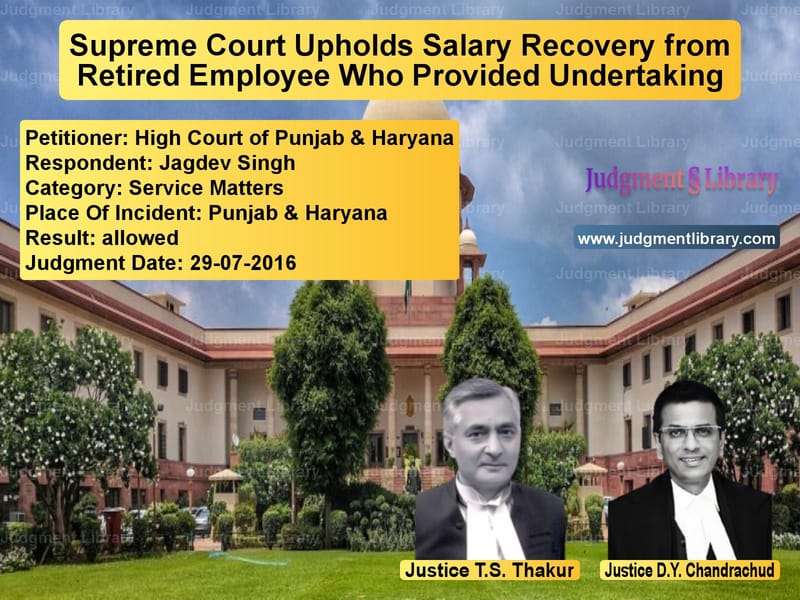Supreme Court Upholds Salary Recovery from Retired Employee Who Provided Undertaking
The Supreme Court of India delivered an important judgment in High Court of Punjab & Haryana v. Jagdev Singh, clarifying the principles governing the recovery of excess salary payments from retired employees. The case revolved around whether the government could recover an excess payment made to a judicial officer after his retirement, especially when he had provided an undertaking to return any overpayment. The Supreme Court ultimately ruled in favor of the recovery, setting aside the Punjab and Haryana High Court’s decision.
Background of the Case
The respondent, Jagdev Singh, was appointed as a Civil Judge (Junior Division) in Haryana on July 16, 1987, and was later promoted as an Additional Civil Judge on August 28, 1997. As per the Haryana Civil Service (Judicial Branch) and Haryana Superior Judicial Service Revised Pay Rules, 2001, his pay scale was revised, and he was required to provide an undertaking agreeing to return any excess salary payments that might be detected in the future.
In compliance, Jagdev Singh provided his undertaking and received the revised salary under the selection grade of Rs. 14,300-18,000. However, in subsequent years, his salary was revised again following the recommendations of the Shetty Commission. This led to the realization that he had received an excess payment of Rs. 1,22,003.
Meanwhile, he was placed under suspension on August 19, 2002, and later compulsorily retired from service on February 12, 2003. Following his retirement, a recovery notice for Rs. 1,22,003 was issued to him on February 18, 2004.
High Court Ruling
Jagdev Singh challenged the recovery notice before the Punjab and Haryana High Court through a writ petition under Article 226 of the Constitution. The High Court ruled in his favor, holding that since he had retired, the government could not recover the excess payment. The court emphasized that he had not committed any fraud or misrepresentation to receive the additional salary, and therefore, the government’s decision to recover the amount was unjustified.
Supreme Court’s Analysis
The Supreme Court reviewed the case and noted the following key aspects:
1. Validity of Recovery from Retired Employees
The Court examined the principle established in State of Punjab & Ors. v. Rafiq Masih, which outlined situations where salary recovery from employees would be impermissible. In that case, the Court had held that the recovery of excess salary would be unfair in the following situations:
- Recovery from Class-III and Class-IV employees.
- Recovery from retired employees or employees close to retirement.
- Recovery of amounts over five years old.
- Recovery where the employee was wrongly assigned higher duties.
- Recovery that would be harsh or arbitrary.
However, the Supreme Court in Jagdev Singh’s case made a critical distinction: the previous rulings applied only when an employee had received excess payments unknowingly. Here, Jagdev Singh had provided an explicit undertaking to return any excess payments, making his case different.
2. Importance of the Undertaking
The Supreme Court ruled that since Jagdev Singh had willingly signed an undertaking while accepting the revised pay scale, he was legally bound to return the excess payment when detected. The Court stated:
“While opting for the benefit of the revised pay scale, the Respondent was clearly on notice of the fact that a future re-fixation or revision may warrant an adjustment of the excess payment, if any, made.”
The judgment highlighted that contractual obligations, including those made through an undertaking, must be honored.
3. Recovery in Installments
The Court recognized that an immediate lump sum recovery might cause hardship to Jagdev Singh. Therefore, it ruled that the recovery should be made in equated monthly installments over two years to ease the financial burden.
Supreme Court’s Final Decision
The Supreme Court ruled in favor of the government and set aside the High Court’s order. It allowed the recovery but directed that it be done in a reasonable manner:
- Recovery of Rs. 1,22,003 was deemed valid.
- The amount would be deducted in equal monthly installments over two years.
- No interest or penalties would be imposed on the excess payment.
Conclusion
This judgment is significant as it reaffirms that if an employee provides a written undertaking to return excess salary payments, the government is legally entitled to recover the amount, even after retirement. The decision serves as an important precedent for salary disputes involving government employees and ensures that administrative errors in salary payments do not result in undue financial losses to the state.
The case also underscores the necessity for employees to carefully evaluate the implications of undertakings they sign regarding salary adjustments, as these commitments will be enforced in the future.
Don’t miss out on the full details! Download the complete judgment in PDF format below and gain valuable insights instantly!
Download Judgment: High Court of Punjab vs Jagdev Singh Supreme Court of India Judgment Dated 29-07-2016-1741873421715.pdf
Direct Downlaod Judgment: Direct downlaod this Judgment
See all petitions in Pension and Gratuity
See all petitions in Employment Disputes
See all petitions in Judgment by T.S. Thakur
See all petitions in Judgment by Dhananjaya Y Chandrachud
See all petitions in allowed
See all petitions in supreme court of India judgments July 2016
See all petitions in 2016 judgments
See all posts in Service Matters Category
See all allowed petitions in Service Matters Category
See all Dismissed petitions in Service Matters Category
See all partially allowed petitions in Service Matters Category







